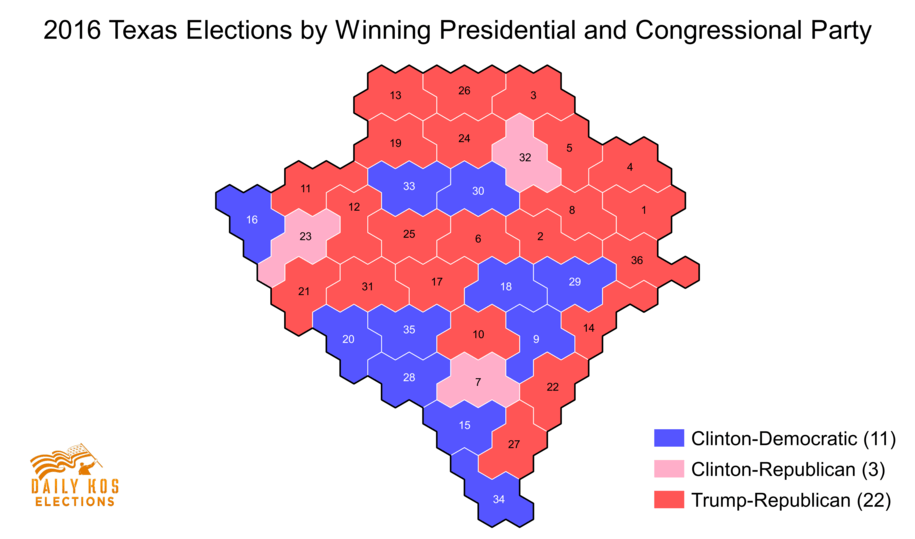We’ll see what this means in practice.
The House Democratic campaign arm, the Democratic Congressional Campaign Committee, announced Monday morning that the party intends to target two longtime GOP incumbents that, until recently, have long been considered locks for re-election: U.S. Reps. Pete Sessions of Dallas and John Culberson of Houston.
The two races are in addition to the committee’s targeting of U.S. Rep. Will Hurd of San Antonio, who represents Texas’ 23rd District, a perennial target which includes much of the state’s border communities.
[…]
Democratic presidential nominee Hillary Clinton carried all three districts in November, falling just short of an outright majority in each place, according to a DCCC analysis of election records. In contrast, Republican presidential nominee Mitt Romney won the same districts in 2012.
While many political observers say Clinton’s performance was likely a one-time phenomenon in the Sessions and Culberson districts, it could serve as a warning sign to Republican incumbents as split-ticket voting is a diminishing habit.
Culberson’s district saw the most dramatic shift: Romney carried the seat with 60 percent of the vote. Four years later, Trump drew 47 percent support, according to the DCCC.
[…]
Democrats on Capitol Hill say President Trump’s performance in Texas against Clinton is why they are concentrating on a state they mostly ignored in the last several cycles, save for Hurd’s district. Trump’s 9-point win over Clinton in Texas was the narrowest for a Republican presidential candidate in 20 years.
Democrats further argue that Trump underperformed in Texas’ urban areas, particularly in Dallas and Harris Counties. At least one Democratic operative close to leadership who was not authorized to speak on the record called the president a potential “albatross around their neck.”
Multiple interviews with House Democratic sources have yet to scare up any possible recruits in the two districts.
“It’s more of a, ‘Where can we go and create opportunities?'” said Moses Mercado, a plugged-in Washington lobbyist with Texas roots.
See here for some background. There’s no doubt that Trump underperformed in urban areas like Houston and Dallas. Further, the evidence I have so far suggests that the underlying partisan mix shifted in Democrats’ favor at least in CD07 and likely CD32; I have not had a chance to look at any part of CD23 yet. CDs 07 and 32 are still reliably Republican, but they are not overwhelmingly so. If 2018 winds up being a strong Democratic year, they’re in the ballpark. Even if not, if the partisan ground shifts by as much between 2016 and 2020 as it did between 2012 and 2016, then these two become genuine swing districts. Just in time for the next round of redistricting, to be sure, but still. It makes sense to pay attention to them, and there’s no reason not to start now.
For all the time I’ve spent cautioning about Presidential numbers versus judicial race numbers in gauging legislative districts, I am intrigued by the potential here. There were large numbers of Republicans in CD07 and CD32 who voted for Hillary Clinton over Donald Trump, and a few more who voted for Gary Johnson or Evan McMullin or some other minor candidate instead of Trump. Surely some of these people, even as they generally voted Republican otherwise, will be open to the argument that in this election, if they still oppose Trump and want to do something to stop him, they need to vote against the members of Congress who are enabling him. I don’t know how many of these crossover voters might be willing to consider that – whatever the number is today, it may well be very different next fall – but we have some time to identify them and to figure out the best way to present that argument to them. If the DCCC really is serious about this, one way they can show it is to do a deep analytics dive into the precinct-level data and figure out who their target audience is. The hard part will be coming up with a message that is persuasive to them without alienating core Democrats, who are not going to be very tolerant about appeals to centrism or bipartisanship. A simple motto of “oppose Trump by opposing this Congressman who stand with him” is probably best.
As for finding candidates, we already have one in CD07, and I’m sure there will be plenty of people interested in CD23, as it is perennially competitive. As for CD32, again I’m sure there will be plenty of people who might want to run, but let me put in a good word for Allen Vaught, Army Reserve captain in Iraq and former State Rep from Dallas. I have no idea if he might be interested, but I do know he’d be a good candidate. D Magazine suggests current Dallas Mayor Mike Rawlings, who would also be a fine choice. Let the recruiting begin!


Three-time loser James Cargas (in an e-mail to his alleged supporters) is accepting money for another run in CD7.
Just say NO, y’all. Go Deb Kerner!
i guess this means they plan to let us in CD 21 continue twisting in the wind …
stupid democrats.